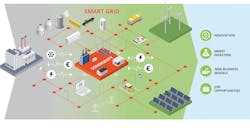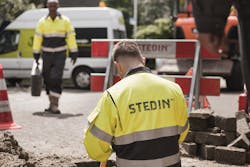Stedin Strives to Make Rotterdam an Energy Neutral City
The falling cost of renewable energy technologies such as solar — due to efficiency from the increasing availability of energy storage — is encouraging a shift to generate energy at a community level. Some 5000 community groups in the UK explored this opportunity between 2009 and 2015, and research suggests the community-scale solar market for municipal and cooperative utilities could exceed 10 GW by 2020.
As this trend continues, utilities and government organizations are investigating these opportunities. Stedin Netbeheer BV, one of the top three distribution system operators (DSO) in the Netherlands, is exploring how it can play a role in growing the emerging community energy market.
As part of this exploration, it is acting as the DSO in a new partnership formed in 2017 with the city of Rotterdam, independent energy aggregator Lyv Smart Living, OMNETRIC, and Siemens. They are partnering on one of the largest smart grid projects in Europe: implementing a distributed energy management system across Rotterdam, starting in the Merwe-Vierhavens harbor area.
The Siemens-OMNETRIC solution will enable the city to manage energy demand and generation flexibly across the district. Increased control of the network will enable Stedin to leverage demand-response capabilities better, helping it to manage peaks in power usage and reduce congestion on the distribution network. The solution aims to create a completely energy-neutral city by 2050. The Rotterdam partners believe reliance on an intelligent grid will go beyond reducing the cost of grid reinforcement. They also believe it will stimulate investment in more sustainable electricity generation and innovation related to storage, as well as lowering investment costs in future network development.
Community Energy
While sustainability is important, a recent research study by OMNETRIC found that the primary goal of community energy initiatives is economic. The groups involved in these initiatives cite the potential for more affordable energy as well as the opportunity to keep the value generated by their local energy system within the community. Stedin supports these aspirations in Rotterdam and across its territory, but the utility must resolve cost and value issues at a time when there is an increasing energy demand and more extensive renewables penetration.
Despite a growing demand for increased reliance on renewable energy resources, a lack of common systems and standards used by today’s utilities traditionally has led to complexity when integrating and managing renewables on the network. The rapid growth of solar and wind energy makes it difficult to forecast what part of the network requires reinforcement. In addition, DSOs need to find ways to manage surplus energy generated as well as network congestion.
The desire to incorporate more renewables into the existing infrastructure could prove capital-intensive. Recent findings from Accenture’s Digitally Enabled Grid research indicate some 59% of distribution utilities believe they will exhaust their distributed generation hosting capacity within 10 years. Thereafter, accommodating new renewable generation on the existing distribution network will require increasingly high capital reinforcement costs.
Managing Demand with IT
The costs of network reinforcement for the Rotterdam project have not been determined, but economic modeling suggests deploying customer-facing smart grid solutions could reduce capital spending for small-scale distributed generation network reinforcement. The Rotterdam project provides Stedin with the opportunity to explore digital means to reduce the cost of reinforcing the network while simultaneously increasing the integration of renewable energy.
Stedin is using its experience dealing with congestion management to identify a better way to manage energy demand using information technology (IT). The utility can identify those sections of the existing network that required reinforcement, thereby reducing the cost of a wholesale upgrade. During its review of solar panels across the city of Rotterdam, the utility found that — although the solar panels can generate a huge amount of energy during the summer — not all the additional energy produced could be absorbed by the network. Stedin traditionally would have to reinforce the network; however, for a city like Rotterdam, extensive reinforcement to strengthen the network is not feasible, so flexibility through IT can play a strategic role.
The new distributed energy management system will balance electricity consumption and generation, helping Stedin to manage peaks in power usage and reduce congestion across the network. The city believes, in addition to the reduction in emissions, this project will provide the opportunity to build economic and sustainable value for the district as well as expand the model more broadly across the city and surrounding areas. Indeed, the aim of the partnership is to have 20,000 connections (smart homes, businesses, industry, renewable production) within its city limits to the energy-sharing system in the next three years.
Smarter, Greener Future
Stedin’s involvement in this project has motivated the utility to take more steps to shape the new energy economy. The Rotterdam project will act as a test bed for gauging the practicality and potential success of a new markets business model, called the universal smart energy framework (USEF), which is gaining growing visibility in Europe and the United States. This framework is helping to identify and define new roles that are being created as a result of the energy transition. For example, in the former market model, there was no need for an aggregator, but that is changing now.
The introduction of energy aggregators is important for DSOs such as Stedin because they help to identify customer energy demands and what costs a customer might — or might not — be willing to pay for energy supply. It will enable Stedin to not only test its value propositions but also determine if customers are willing to act on them.
For example, identifying customer needs will make it easier for DSOs to increase network flexibility and reduce congestion while alleviating some of the risks and guesswork involved. In the future, this should enable a greater ability to offer customers a wider choice of products and even greater reassurance of service reliability, while simultaneously ensuring the new business model is sustainable and successful.
A New Future
Through its partnership with the city of Rotterdam, Lyv Smart Living and experts in the energy IT sector, Stedin can explore the potential benefits community energy projects can offer. The ability to identify new ways to reinforce and manage the network better is another step toward being able to offer the next generation of reliability, resilience and product choice. The commitment of the partners on the Rotterdam project to achieving this ambition is strong and the work on this deployment, in conjunction with both OMNETRIC and Siemens, has only furthered its potential.
With the project kickoff in June 2017, the partners are focused on the next few years, with an eye to 2050, to see whether Rotterdam can successfully achieve its ambition of being an energy-neutral city. This project is just one of many in which Stedin is participating across high-density urban areas in the Netherlands. All the projects reflect Stedin’s aim of ensuring a future energy system where the mix of energy is sustainable and generated locally.
The utility believes the eventual results of the Rotterdam partnership will go further in proving it is possible to integrate as well as effectively and flexibly manage renewable energy resources connected to the network without disruption. If all goes well, Rotterdam will be an energy-neutral city whereby the energy produced will equal the energy consumption in the not-too-distant future.
Arnoud Rijneveld, previously with Stedin Netbeheer BV, was awarded a bachelor’s degree from the RSM Erasmus University before joining Stedin in 2010. His main responsibilities were linked to activities that contribute toward energy transition and the changing roles focusing on consumer engagement, business models, demand response and communities, namely, working on the challenges toward a new energy future.
For more information:
Accenture | www.accenture.com
Lyv Smart Living | https://getlyv.com
OMNETRIC | www.omnetric.com
Siemens | www.siemens.com
Stedin | www.stedin.net
About the Author
Arnoud Rijneveld
Arnoud Rijneveld, previously with Stedin Netbeheer BV, was awarded a bachelor’s degree from the RSM Erasmus University before joining Stedin in 2010. His main responsibilities were linked to activities that contribute toward energy transition and the changing roles focusing on consumer engagement, business models, demand response and communities, namely, working on the challenges toward a new energy future.


